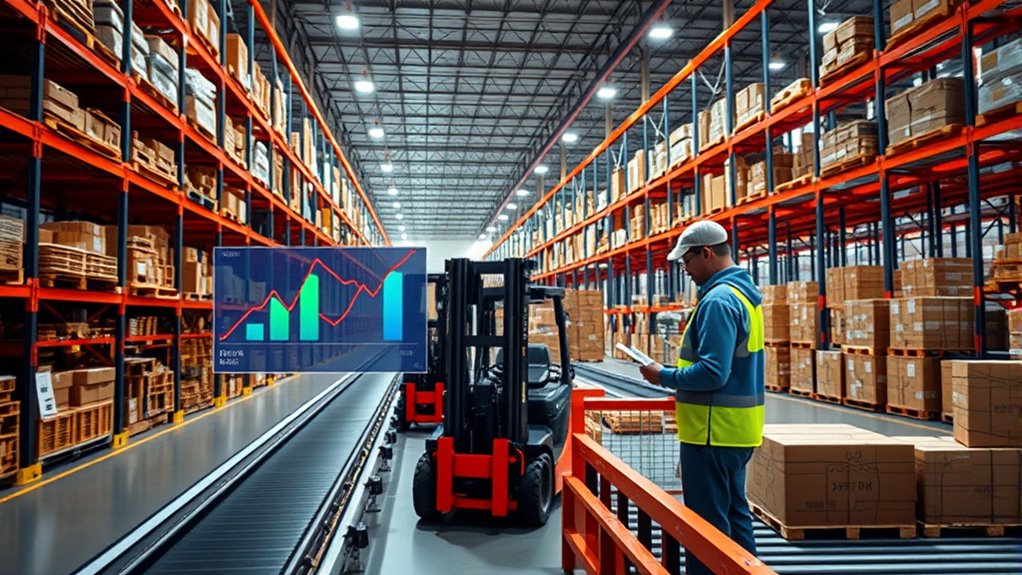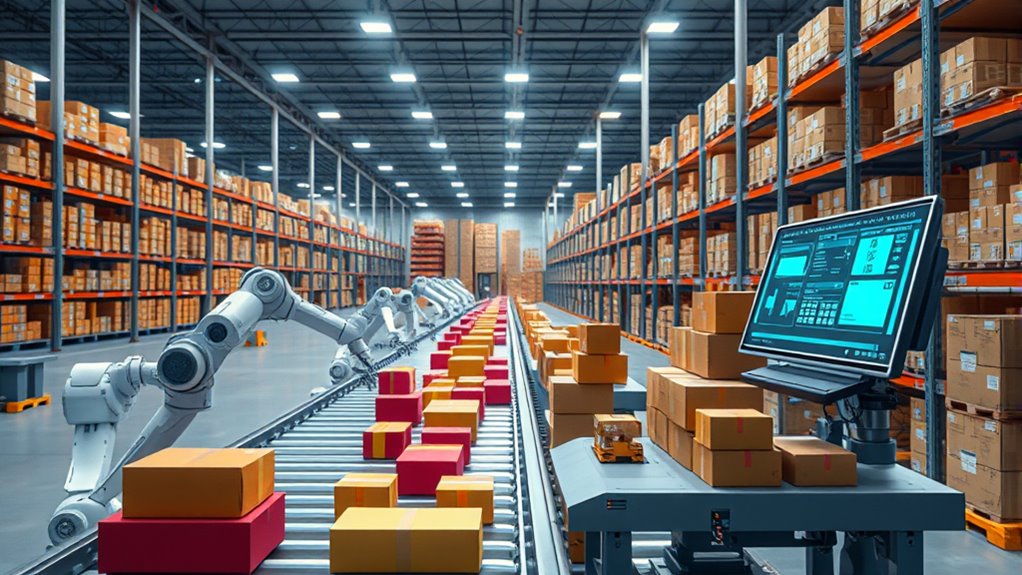AI is revolutionizing supply chains by reducing waste and boosting profits through smarter inventory management, predictive maintenance, and enhanced visibility. It helps you adjust stock levels precisely, forecast equipment failures, and identify bottlenecks, preventing excess inventory, costly breakdowns, and inefficiencies. By responding quickly to demand shifts and optimizing operations, AI keeps your supply chain resilient and sustainable. To discover how you can leverage these innovations for your business success, explore further insights.
Key Takeaways
- AI optimizes inventory levels by predicting demand, reducing excess stock and associated costs.
- Predictive maintenance minimizes downtime and costly repairs, ensuring smoother operations.
- Enhanced supply chain visibility identifies inefficiencies and suggests improvements, cutting waste.
- Real-time data analysis enables quick responses to demand changes, preventing overproduction.
- AI-driven insights foster smarter decision-making, lowering costs and increasing profitability.

Artificial intelligence is transforming supply chains by substantially reducing waste and increasing efficiency. When you harness AI, you gain the ability to fine-tune inventory management, ensuring that stock levels align perfectly with demand. This concept, known as inventory optimization, helps you avoid excess inventory that ties up capital and risks becoming obsolete. Instead, AI analyzes historical sales data, market trends, and seasonal patterns to predict future demand more accurately. As a result, you can order precisely what’s needed, reducing overstock and understock situations. This not only cuts storage costs but also minimizes waste from unsold or expired goods, directly boosting your profit margins.
AI-driven inventory management reduces waste and costs by accurately predicting demand and optimizing stock levels.
In addition to inventory optimization, predictive maintenance plays a essential role in minimizing waste and downtime. AI-driven predictive maintenance systems monitor equipment in real time, analyzing data from sensors embedded in machinery. You don’t have to wait for a breakdown to happen; instead, AI forecasts potential failures before they occur. This proactive approach allows you to schedule maintenance during preferable times, avoiding costly shutdowns and preventing the waste associated with emergency repairs or equipment failure. When your machinery runs smoothly, your supply chain becomes more reliable, reducing delays and ensuring products reach customers on time. Moreover, fostering a culture of continuous improvement can help your team adapt to AI-driven processes and enhance overall efficiency.
Implementing AI for inventory optimization and predictive maintenance also enables you to gain greater visibility into your entire supply chain. You can identify bottlenecks, inefficiencies, and areas where waste accumulates. With this insight, you can make smarter, data-driven decisions that improve overall operations. For example, AI can suggest alternative sourcing options or adjust delivery schedules to optimize logistics and minimize transportation waste. This heightened awareness helps you stay agile in a competitive marketplace, reducing excess costs and environmental impact. Additionally, integrating accurate data collection practices ensures that AI recommendations are reliable, further reducing waste. Incorporating data quality as a foundational element enhances the precision of AI insights and decision-making.
Moreover, AI’s ability to analyze vast amounts of data in real time means you can respond swiftly to fluctuations in demand or supply disruptions. This agility prevents overproduction, excess inventory buildup, and unnecessary resource consumption. It also allows you to anticipate problems before they escalate, reducing waste associated with defective products or production errors. As you embrace AI technology, you’re not only cutting waste but also creating a more sustainable, resilient supply chain that adapts seamlessly to changing conditions. Emphasizing continuous data monitoring can help maintain accuracy and identify new opportunities for waste reduction.
In essence, AI empowers you to make smarter decisions, optimize your inventory, and maintain equipment proactively. These innovations lead to less waste, lower costs, and higher profits—proving that AI isn’t just a tech trend but a crucial tool for modern supply chain success. Emphasizing the importance of data accuracy in your AI systems ensures that the insights generated are reliable and actionable, further enhancing waste reduction efforts. Developing a culture of innovation within your organization can further accelerate the adoption of AI-driven solutions and maximize their benefits.
Frequently Asked Questions
How Quickly Can Companies See Results From AI Supply Chain Solutions?
You can often see results from AI supply chain solutions within a few months. By leveraging real-time analytics, you gain immediate insights into your operations, enabling faster decision-making. Predictive maintenance helps prevent costly breakdowns, reducing downtime quickly. As you implement these tools, expect efficiency gains and cost savings to become visible relatively fast, especially when you continuously monitor and optimize your processes based on the AI-driven data.
What Are Common Challenges in Implementing AI for Supply Chain Management?
You might worry about AI implementation complexities, but addressing change management and skill gaps is key. Common challenges include resistance to change, as staff adjust to new systems, and a lack of expertise in AI technologies. To succeed, focus on training your team and fostering a culture open to innovation. Overcoming these hurdles guarantees smoother integration, making your supply chain more efficient and responsive, ultimately boosting your profits and competitive edge.
How Does AI Handle Unforeseen Supply Chain Disruptions?
AI handles unforeseen supply chain disruptions by leveraging predictive analytics to identify potential risks early. You can rely on AI to analyze data patterns and forecast disruptions before they occur. This allows you to implement risk mitigation strategies proactively, minimizing delays and costs. By continuously monitoring supply chain variables, AI helps you respond swiftly and adapt to unexpected events, keeping your operations resilient and efficient amidst uncertainties.
What Is the Cost of Adopting AI Technologies in Supply Chains?
The cost of adopting AI in supply chains might seem like a mountain, but with careful cost analysis, you’ll find it’s a strategic investment worth making. While initial investment risks include tech costs, training, and integration, the long-term benefits—like reduced waste and increased efficiency—can outweigh these upfront expenses. Embracing AI today positions you ahead of competitors, turning potential costs into valuable growth opportunities.
How Does AI Ensure Data Security in Supply Chain Operations?
You can trust AI to enhance data security in supply chains by implementing strong cybersecurity protocols and data encryption. AI actively monitors for potential threats, swiftly identifying suspicious activities. It automates security measures, reducing human error, and guarantees sensitive information stays protected. By continuously learning from new threats, AI adapts, helping you maintain a secure supply chain environment and safeguard valuable data effectively.
Conclusion
You might think AI is just a fancy tool, but it’s actually transforming supply chains by cutting waste and boosting profits. Some say it’s too complex or costly to implement, but the long-term savings and efficiency gains far outweigh the initial investment. Embracing AI now means you stay competitive and maximize profits while reducing waste. Don’t let doubts hold you back—adopting AI is the smart move for a leaner, more profitable supply chain.
Amina brings over a decade of journalism experience to her role as Editor-in-Chief. Under her leadership, Exquisite Post has flourished, maintaining the highest standards of integrity and excellence. Amina’s commitment to truth and her visionary approach guide the editorial team in producing impactful news stories that resonate with our audience.










